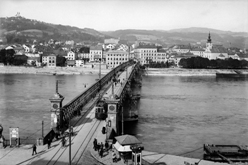Upheaval 1918 - 1921

The collapse of the Danube monarchy and the creation of the republic were accompanied in Linz, as in Vienna, by outbreaks of revolutionary fervour. These were accompanied by food shortages - which partly lasted until 1921 - which contributed to unrest and outbreaks of violence.
On the 16th November 1918, the newly formed municipal council had a German Nationalist majority and mayor. The Social Democratic Party won an absolute majority at the first democratic municipal elections in 1919, however.
The Social Democrat Josef Dametz became first democratically elected mayor of the city. Shortages of food and fuel, housing misery and inflation demanded prudent local policy-making. Supporting and expanding communal businesses became one of the focal points of the communal policy of the time. But despite attempts to reach consensus on most issues, ideological disagreements between the parties soon became apparent.
Back to the list of contents "Linz between Democracy and Dictatorship 1918-1945"